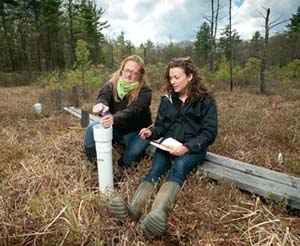 |
 |
| current issue |  | past issues |  | send a letter/news |  | address update |  | advertise |  | about us |  | alumni home |
Features
|
Return to Don't Cast Off Without a Paddle |
How do you collect methane samples on a windy Swedish lake?
Jacqueline Amante's four years of undergraduate research at UNH took her out of the classroom and into the wide world of hands-on science. It will propel her to graduate school and, she anticipates, a career as a research scientist. It also gave her the opportunity to learn, the hard way, some important less-than-scientific principles needed for the job. Like, don't pull your anchor before starting the engine, and make sure to preserve aquatic critters first before putting them in the fridge overnight.
"After my sophomore year I went to the University of Idaho to study the effects of nitrogen loading on blue-green algae and tiny animal-like organisms known as zooplankton, which I gathered from a lake in neighboring Oregon. Once, I pulled up the anchor only to find I'd run out of gas and had to paddle awkwardly back to shore, and another time I didn't put chemical preservative in my sample bottle and they gobbled each other up during night," she says with a sheepish grin. Come morning, in a floating standoff, only two fat zooplankton remained and Amante had to drive four hours back to the lake to gather more of the voracious little beasties.
All life lessons for a budding scientific researcher. Such was the case last summer, too, when as part of her senior thesis project (and funded in part by an IROP grant from the Hamel Center), Amante spent nine weeks in the 24-hour daylight above the Arctic Circle gathering samples of methane gas from peatland and lakes in the hinterlands of Sweden. Methane is a powerful greenhouse gas but measuring it is tricky and so its contribution to global warming is poorly understood.
 Jacqueline Amante ’12, environmental science: ecosystems major, right, with Ruth Varner ‘93G, ‘00G, research associate professor, Earth Systems Research Center |
She collected data from dawn to dusk despite vast, droning clouds of mosquitoes and another run-in with a boat—this time trying to overcome the challenge of rowing with precision up to an underwater methane sensor to withdraw gas samples by syringe. Even Amante's faculty mentor, Ruth Varner ‘93G, ‘00G, wasn't much help when it came to doing science via inflatable rowboat. Recalls Amante, "One day the wind proved too much for us and we spent nearly half an hour struggling to reach a sensor. We laughed the whole time and so did our onshore Swedish colleagues, who called us novice rowers."
Notes Varner, a research associate professor at the Earth Systems Research Center within the UNH Institute for the Study of Earth, Oceans, and Space, "Novice is putting it kindly."
Amante could still do good science without being an expert oarswoman, but if she hadn't known how to do things by the book while collecting data she would have been up the creek without a paddle, scientifically speaking. Not a problem, says Varner.
"She's extremely detail oriented and knows how to follow protocols to a tee. In science, if we don't repeatedly follow the protocols we can't trust the data, and the dataset Jacki collected so flawlessly is absolutely critical for this project to move forward."
Varner heads up the project, which last summer was an effort to prove that a unique sensor designed and built at EOS could reliably and accurately gauge methane emissions that bubble up through peat and from lakebeds. Now, with both the technology and the student role in gathering data proven, and with funding from the National Science Foundation, Varner will move the project forward by taking nine undergraduates from eight different universities, including two from UNH, back to Sweden to learn more about the changing ecosystem.
"You might say I helped work out the kinks with last year's fieldwork so things will go more smoothly for the undergraduates this summer," says Amante, who got in on the ground floor of the methane project by serendipity. She first met Varner, who coordinates the UNH Environmental Sciences program, to get the official okay on using her Idaho research project as the "capstone" experience, which is required of all environmental science students. In their discussions, Varner happened to mention the upcoming work in Sweden and the opportunity it presented for an undergraduate researcher. As Amante listened, she realized the project contained a mix of ingredients she relished—international travel, scientific research on lakes, and a potential faculty mentor with whom she immediately felt comfortable.
"I love lakes, wanted to travel to Europe, and Ruth has a very easygoing demeanor. I could tell just how passionate she was about the project in Sweden, which was very appealing. I was hooked from the start." Adds Amante, who hopes to pursue a master's degree and retain Varner as her advisor, "Undergraduate research provides so much that you just can't get in the classroom. When I had to figure things out on my own it made me feel confident and independent, and I'll graduate feeling like I truly am an environmental scientist already."
—David Sims '81
blog comments powered by Disqus

